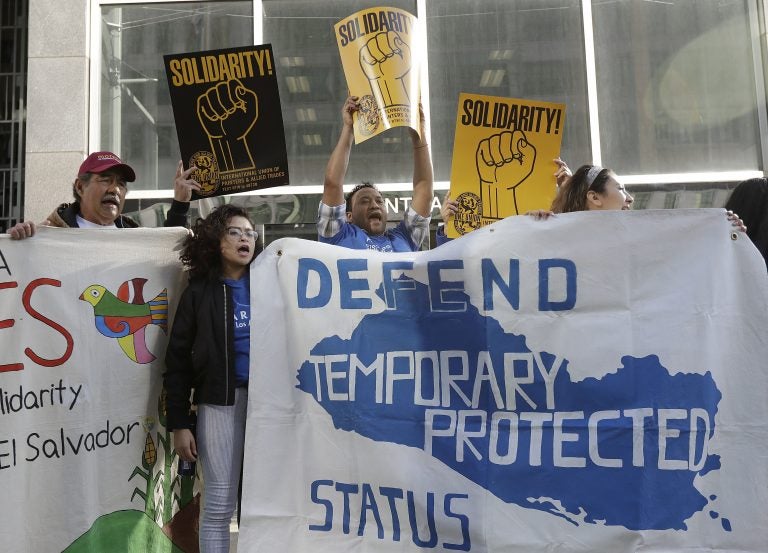Migrants embrace ruling that keeps temporary status for now
Hundreds of thousands of immigrants got temporary relief after a federal judge blocked the Trump administration from moving ahead with its plans.

In this Monday, March 12, 2018, file photo, supporters of temporary protected status immigrants hold signs and cheer at a rally outside of a federal courthouse in San Francisco. A judge on Wednesday, Oct. 3, 2018, blocked the Trump administration from ending protections. (Jeff Chiu/AP Photo, File)
When Sudanese immigrant Hiwaida Elarabi learned the U.S. government was ending the temporary protected status that allowed her to live and work in the country legally for two decades, she sold off the restaurant that had been her life’s dream.
Terrified to return to Sudan and unable to fathom a life without proper legal documents, the 55-year-old was one of hundreds of thousands of immigrants who got temporary relief after a federal judge blocked the Trump administration from moving ahead with its plans.
“This is a good day,” Elarabi said Thursday. She now works for a university in Massachusetts after obtaining her master’s degree in bioinformatics. “I was stressed I might also lose my position at the university as well as my legal status in this country.”
Elarabi is one of some 300,000 immigrants from Sudan, El Salvador, Haiti and Nicaragua who for now will keep their temporary protected status, known as TPS, under the ruling. It’s granted to citizens of countries ravaged by natural disasters or war and lets them live and work in the U.S. until the situation improves back home.
U.S. District Judge Edward Chen in San Francisco granted a request late Wednesday to block the administration’s plans. He found there is evidence that “President Trump harbors an animus against non-white, non-European aliens which influenced his … decision to end the TPS designation.”
The ruling cited Trump’s 2015 campaign speech in which he characterized Mexican immigrants as drug dealers and rapists, his call to bar Muslims from entering the United States and his vulgar reference to African countries during a meeting about immigration at the White House in January.
It is the latest in a series of court decisions that have slowed the Trump administration’s effort to crack down on immigration. Federal courts also pushed back against the administration’s travel ban on several mostly Muslim countries and the separation of immigrant parents and children at the U.S.-Mexico border.
Justice Department spokesman Devin O’Malley said the ruling “usurps the role of the executive branch.”
“The Justice Department completely rejects the notion that the White House or the Department of Homeland Security did anything improper,” he said in a statement.
It wasn’t immediately clear what the process would be to extend immigrants’ temporary status. The issue is expected to be addressed in court later this month.
El Salvador has the largest number of immigrants with temporary status. In January, the Trump administration said it would end the program for the country in September 2019 because progress had been made to recover from a devastating 2001 earthquake.
In March, immigrant advocates sued on behalf of those with the status from El Salvador and from the three other countries who were also told their programs were ending.
Elarabi, who is one of the plaintiffs, said she holds out hope of owning a restaurant again someday after selling hers at a loss because of uncertainty about her status.
Salvadoran paralegal Jose Palma has lived in the Boston area for two decades and has four U.S.-born children ranging from 17 years old to 2 months. If his temporary status ends, the 42-year-old said he would probably return to El Salvador with his three youngest children, leaving his eldest in the U.S. to attend college.
For now, he’s focused on pushing U.S. lawmakers to pass a law allowing immigrants with temporary status to become legal permanent residents. He said the ruling fuels him and others to keep fighting.
“It’s a light in the dark tunnel we’re walking in now,” he said.
Marleine Bastien, executive director of Family Action Network Movement, told reporters in Miami that she expects the federal government to appeal the ruling. She also noted that the decision, while “of great importance,” is only temporary.
Rony Ponthieux, a Haitian immigrant who works as a hospital nurse, said he believes he and others like him deserve to stay in the country because they work hard, pay taxes and contribute to communities just like permanent residents and Americans.
He said he had not started making plans to leave the United States even though his temporary status had been set to expire in July 2019.
“I knew something was going to happen,” Ponthieux said. “I believed in God.”
Taxin reported from Santa Ana, California, and Kay reported from Miami.
WHYY is your source for fact-based, in-depth journalism and information. As a nonprofit organization, we rely on financial support from readers like you. Please give today.




